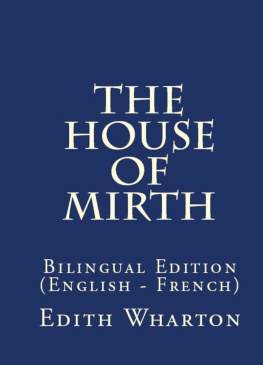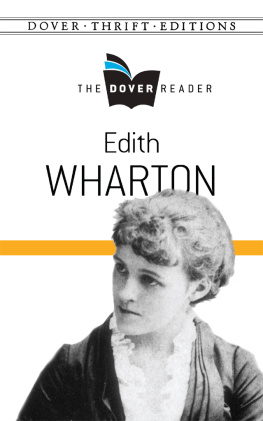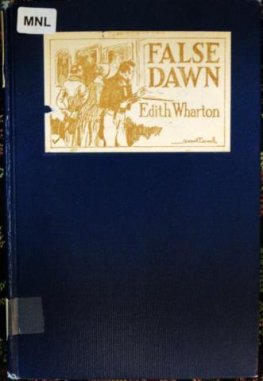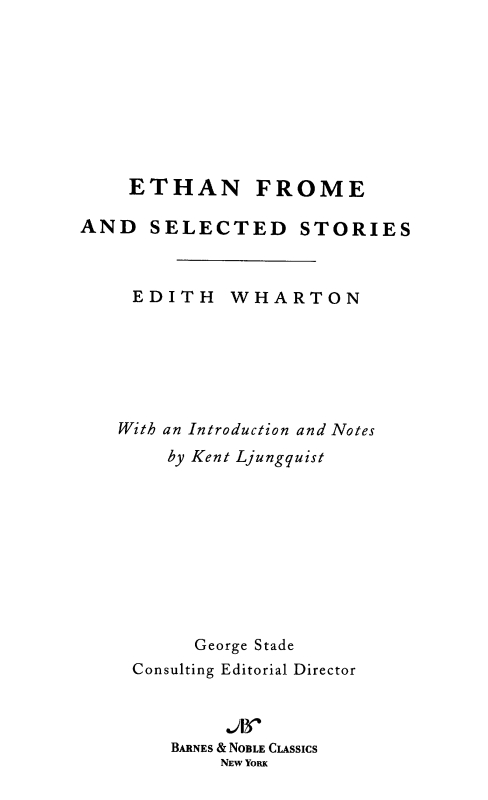
Table of Contents
FROM THE PAGES OF ETHAN FROME AND SELECTED STORIES
If you know Starkfield, Massachusetts, you know the post-office. If you know the post-office you must have seen Ethan Frome drive up to it, drop the reins on his hollow-backed bay and drag himself across the brick pavement to the white colonnade: and you must have asked who he was. (from Ethan Frome, page 8)
It was only when she drew toward her last illness, and his cousin Zenobia Pierce came over from the next valley to help him nurse her, that human speech was heard again in the house. (from Ethan Frome, page 41)
Zeena came into the room with her dragging down-at-the-heel step, and quietly took her accustomed seat between them. (from Ethan Frome, page 69)
The sled started with a bound, and they flew on through the dusk, gathering smoothness and speed as they went, with the hollow night opening out below them and the air singing by like an organ. Mattie sat perfectly still, but as they reached the bend at the foot of the hill, where the big elm thrust out a deadly elbow, he fancied that she shrank a little closer. (from Ethan Frome, page 89)
There was a last instant when the air shot past him like millions of fiery wires; and then the elm ... (from Ethan Frome, page 93)
The way they are now, I dont sees theres much difference between the Fromes up at the farm and the Fromes down in the graveyard. (from Ethan Frome, page 99)
Im so bewildered by this new developmentby his using you all this time as a pretextthat I really dont know where to turn for light on the mystery (from The Pretext, page 130)
Across the level tracery of the gardens, it sent her, from open windows and hospitably smoking chimneys, the look of some warm human presence, of a mind slowly ripened on a sunny wall of experience. (from Afterward, page 149)
You wont know till long, long afterward. (from Afterward, page 167)
Mrs. Ballinger is one of the ladies who pursue Culture in bands, as though it were dangerous to meet alone. (from Xingu, page 203)
Knowing how engrossing the subject is, you will understand how it happens that the club has let everything else go to the wall for the moment. Since we took up Xingu I might almost saywere it not for your booksthat nothing else seems to us worth remembering. (from Xingu, page 214)
I fancy Osric Dane hardly expected to take a lesson in Xingu at Hillbridge! (from Xingu, page 220)
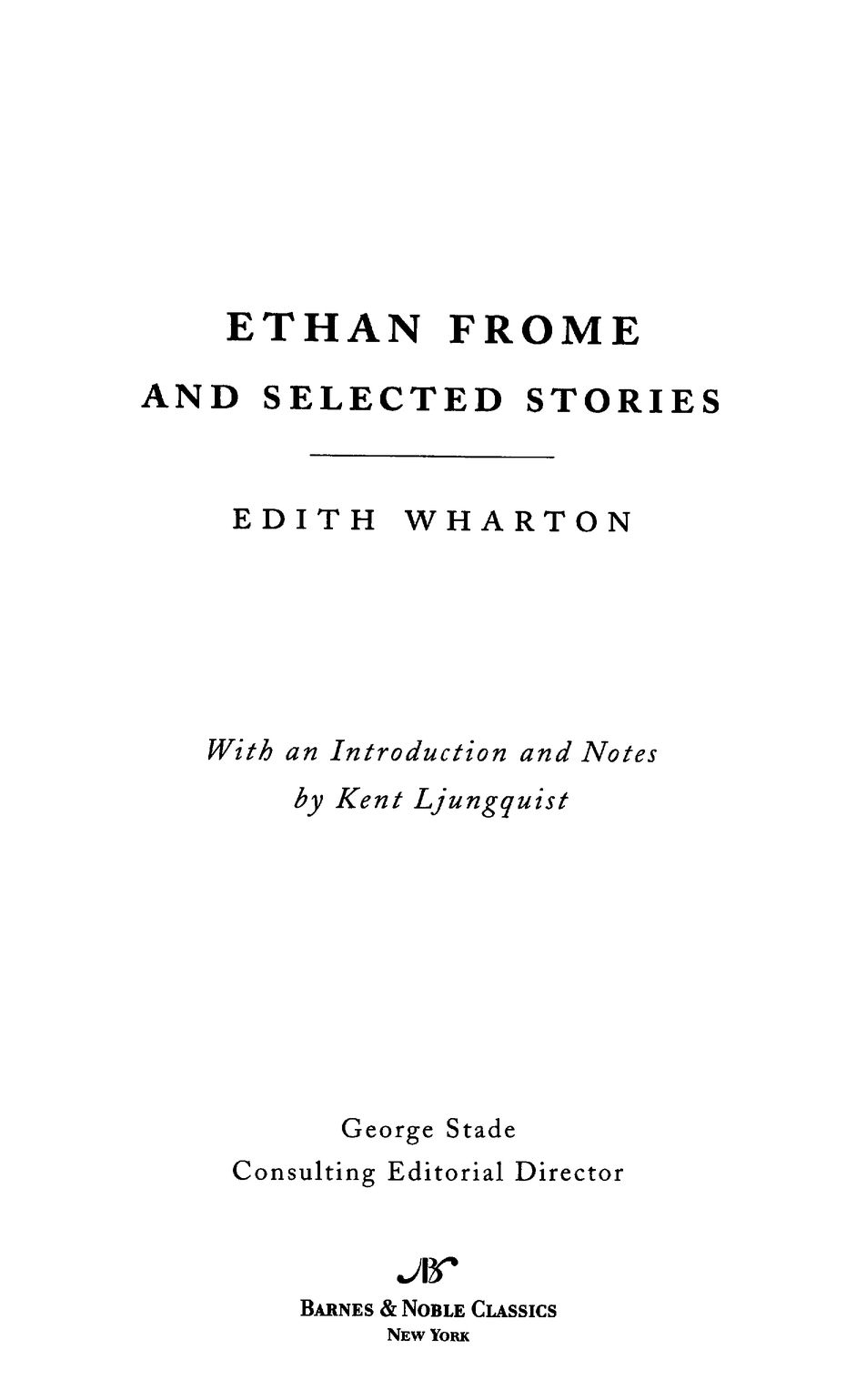
EDITH WHARTON
Edith Newbold Jones was born January 24, 1862, into such wealth and privilege that her family inspired the phrase keeping up with the Joneses. The youngest of three children, Edith spent her early years touring Europe with her parents and, upon the familys return to the United States, enjoyed a privileged childhood in New York and Newport, Rhode Island. Ediths creativity and talent soon became obvious: By the age of eighteen she had written a novella, Fast and Loose (as well as witty reviews of it), and published poetry in the Atlantic Monthly.
After a failed engagement, Edith married a wealthy sportsman, Edward Wharton. Despite similar backgrounds and a shared taste for travel, the marriage was not a success. Many of Whartons novels chronicle unhappy marriages, in which the demands of love and vocation often conflict with the expectations of society. Whartons first major novel, The House of Mirth, published in 1905, enjoyed considerable literary success. Ethan Frome appeared six years later, solidifying Whartons reputation as an important novelist. Often in the company of her close friend Henry James, Wharton mingled with some of the most famous writers and artists of the day, including F. Scott Fitzgerald, Andr Gide, Sinclair Lewis, Jean Cocteau, and Jack London.
In 1913 Edith divorced Edward. She lived mostly in France for the remainder of her life. When World War I broke out, she organized hostels for refugees, worked as a fund-raiser, and wrote for American publications from battlefield frontlines. She was awarded the French Legion of Honor for her courage and distinguished work.
The Age of Innocence, a novel about New York in the 1870s, earned Wharton the Pulitzer Prize for fiction in 1921the first time the award had been bestowed on a woman. Wharton traveled throughout Europe to encourage young authors. She also continued to write, lying in her bed every morning, as she had always done, dropping each newly penned page on the floor to be collected and arranged when she was finished. Wharton suffered a stroke and died on August 11, 1937. She is buried in the American Cemetery in Versailles, France.
THE WORLD OF EDITH WHARTON AND ETHAN FROME

| 1862 | Edith Newbold Jones is born January 24 in New York City, the last of three children. Her parents are wealthy and socially well-connected. |
| 1866 | The Jones family leaves for Europe, where they will live for the next six years. |
| 1870 | In Germany, Edith falls ill with typhoid fever and for a time hovers between life and death. When she recovers, the family moves to Florence. Edith begins writing stories, which she recites to her family. |
| 1872 | The Joneses return to America, where they live in New York City and Newport, Rhode Island. |
| 1877 | Edith finishes a novella, Fast and Loose, which will be published a century later, in 1977. Henry Jamess novel The American appears. |
| 1878 | Ediths mother pays to publish a collection of Ediths poems, Verses. |
| 1879 | Edith is presented to society in New York City. |
| 1880 | A wealthy young man, Henry Leyden Stevens, proposes to Wharton. The Atlantic Monthly magazine publishes five of Whartons poems. |
| 1881 | Henry Jamess novel Portrait of a Lady appears. |
| 1882 | Ediths father dies in the south of France. Edith and her mother return to the United States to find that Henry Stevenss mother disapproves of the engagement. It is broken off, and the Jones women return to France. |
| 1883 | While summering in Bar Harbor, Maine, Edith agrees to marry Edward Wharton, an independently wealthy sports man from Massachusetts. |
| 1885 | Edith and Edward wed and over the next several years divide their time between Europe, New York, and Newport. |
| 1889 | Whartons poems appear in Scribners Magazine and the Atlantic Monthly. |
| 1891 | Whartons first published story, Mrs. Mansteys View, appears in Scribners Magazine. |
| 1897 | The Decoration of Houses appears; it is a nonfiction work on interior design written by Wharton and architect Ogden Codman, Jr. |



